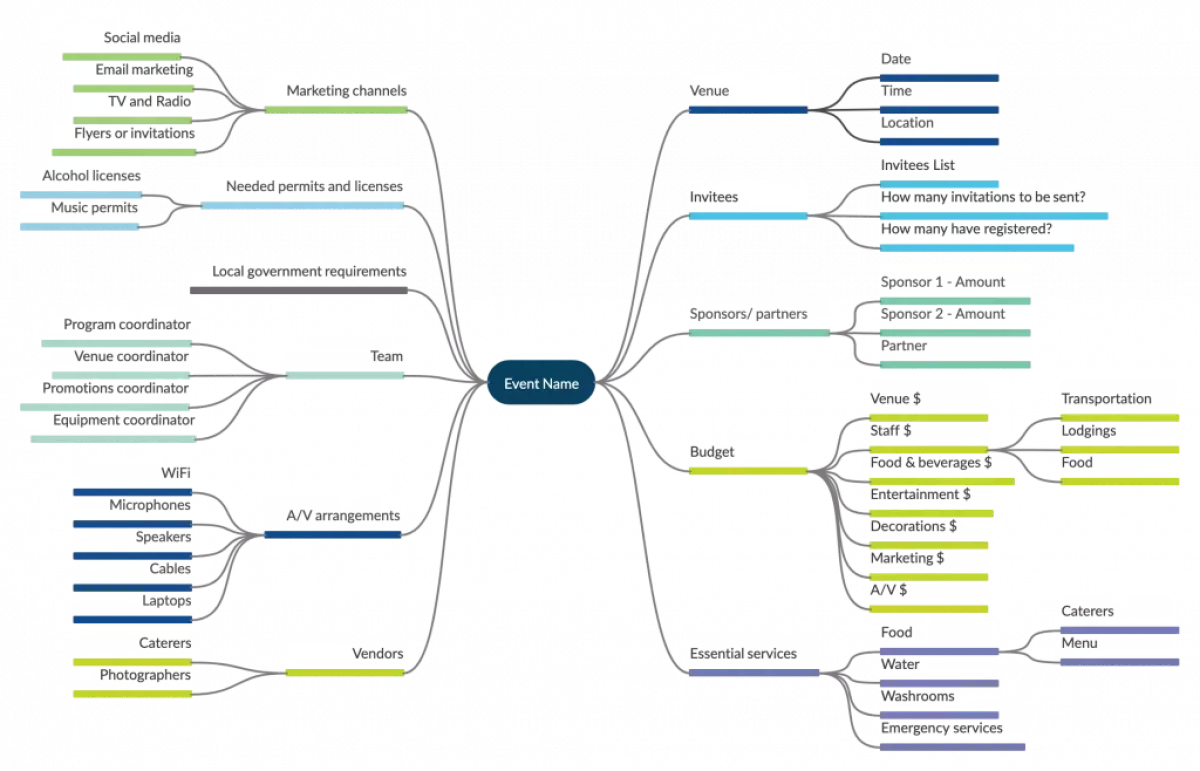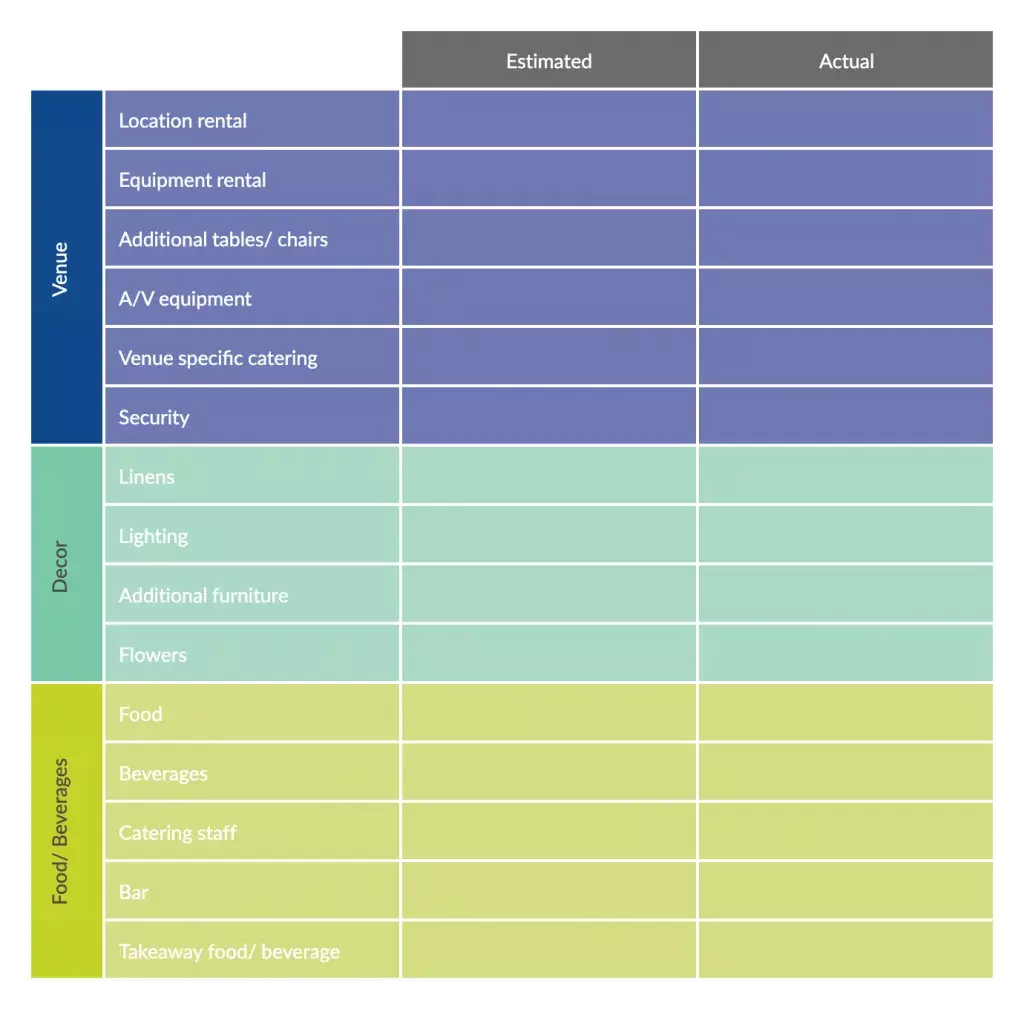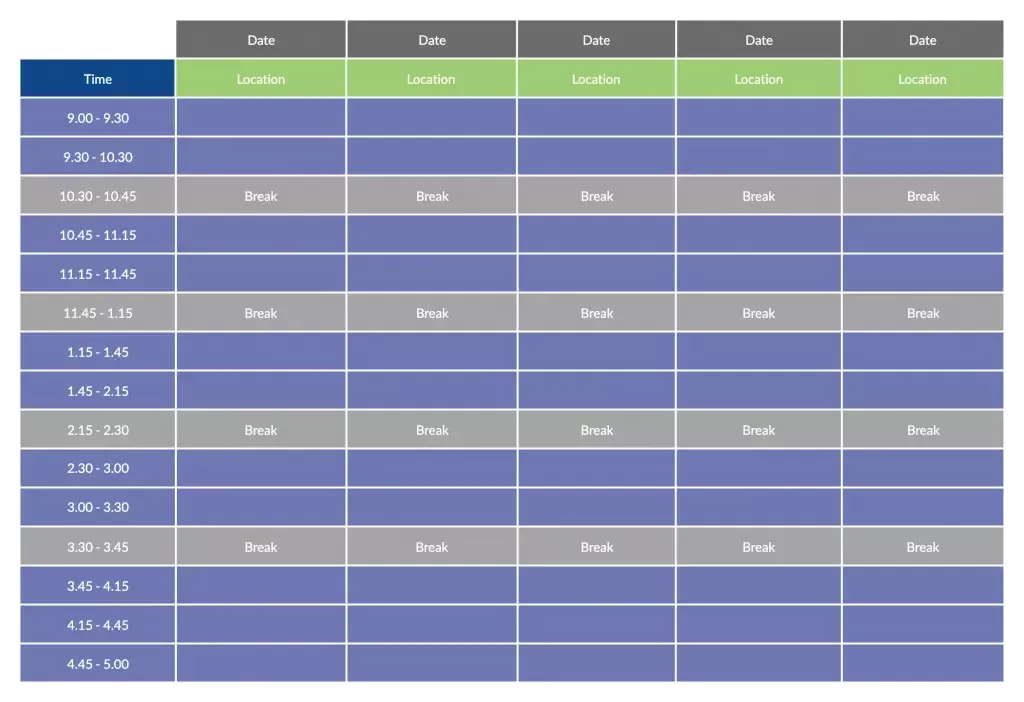Planning an event can be a daunting task, especially when you're faced with numerous details to consider. The larger the event, the more challenges you have to overcome. But fear not, because in this guide, we will show you how to plan an event the easy way. And to simplify things even further, we have included instantly editable templates that you can use to kickstart your project.
What is Event Planning?
Event planning is a meticulous process that encompasses the entire lifecycle of an event, from conception to execution and evaluation. It involves turning ideas and visions into reality, paying attention to every minute detail to ensure a flawless and captivating experience.
In simple terms, event planning is the art of organizing and coordinating various aspects of an event, such as conferences, meetings, weddings, parties, and other social or corporate gatherings. Event planners are responsible for managing all the logistical details, including selecting a venue, creating a budget, coordinating with vendors and suppliers, arranging audiovisual equipment, managing guest lists, and ensuring all necessary permits and licenses are obtained. They also handle catering, transportation, accommodations, decorations, entertainment, and event promotion.
Successful event planning requires strong organizational and time management skills, attention to detail, effective communication, creativity, problem-solving abilities, and the ability to work well under pressure. Event planners often work in teams and collaborate with various stakeholders, including clients, vendors, and venue staff, to ensure a smooth and successful event.
Why is Event Planning Important?
Whether it's a corporate conference, a social gathering, or a personal celebration, event planning is essential for creating remarkable experiences that leave a lasting impact on participants. Here are some reasons why event planning is crucial:
- Strategic Vision and Objectives: Event planning helps you achieve specific goals and objectives by understanding your clients' vision, aligning objectives, and creating actionable plans.
- Seamless Execution and Logistics: Event planners expertly manage complex logistics, coordinating with vendors, securing venues, and ensuring a smooth experience for attendees.
- Enhanced Guest Experience: Event planners curate every element of an event to create exceptional guest experiences, from ambiance and decor to entertainment and catering.
- Professionalism and Attention to Detail: Event planners bring professionalism and expertise to ensure compliance, minimize risks, and execute events flawlessly.
- Time and Resource Management: Event planning optimizes time, money, and resources by prioritizing tasks, allocating resources efficiently, and adhering to timelines.
Things to Consider When Planning an Event
Before diving into the planning process, there are several important factors to consider to ensure the success of your event. Keep these key points in mind:
- Clearly define the purpose of the event and the specific objectives you want to achieve. Whether it's to educate, entertain, network, or raise funds, having a clear understanding of the event's goals is crucial.
- Establish a realistic budget that takes into account all the necessary expenses. Track your expenses throughout the planning process to ensure you stay within budget.
- Select a suitable date and time for the event, considering factors such as the availability of key participants, seasonality, and potential conflicts with other events. Avoid significant holidays or conflicting industry events that may impact attendance.
- Choose a venue that aligns with the event's purpose and can comfortably accommodate the expected number of attendees. Consider location, capacity, accessibility, parking, and available amenities.
- Develop a compelling and cohesive theme for your event. Create a visually appealing and engaging environment through decor, branding, lighting, and audiovisual elements.
- Plan a detailed event program that includes key activities, presentations, performances, and breaks. Create a realistic and well-paced schedule that allows for each activity and considers attendee comfort.
- Research and select reputable vendors and suppliers. Obtain multiple quotes, review contracts carefully, and communicate your requirements clearly to ensure their deliverables align with your expectations.
- Develop a comprehensive marketing strategy to promote your event. Use various channels like social media, email marketing, press releases, and partnerships. Create engaging content and leverage early bird discounts or incentives to boost ticket sales.
- Pay attention to the overall attendee experience. Consider factors such as registration and check-in processes, seating arrangements, networking opportunities, accessibility for attendees with special needs, and post-event surveys to gather feedback.
- Anticipate potential challenges and have contingency plans in place. Prepare for inclement weather, technical difficulties, or last-minute changes. Create backup options and establish clear communication channels to address any unforeseen issues.
How to Plan an Event
Now that you have a clear understanding of what goes into event planning, let's dive into the step-by-step process. Follow these event planning steps to save time and stay within your budget:
- Create an Event Planning Checklist: A checklist is a powerful tool when it comes to planning an event. It keeps you and your team organized and ensures that every detail is taken care of. Use our event planning checklist template as a starting point and customize it to suit your specific event.
 Event Planning Checklist Template (Click on the template to edit it online)
Event Planning Checklist Template (Click on the template to edit it online)
-
Set a Goal for the Event: Establish the goal of your event early on. Determine what you want to accomplish and ensure that your goal adheres to the SMART criteria (Specific, Measurable, Attainable, Realistic, and Timely).
-
Organize Your Team: Assemble a competent team that can help you achieve your event's goals. Clarify roles and responsibilities, establish communication channels, and hold regular committee meetings to discuss progress and address any issues.
-
Establish Your Budget: Consider your budget and allocate funds to different areas of the event, such as venue, staff, food and beverages, entertainment, decorations, marketing, and audiovisual equipment. Use our event budget template to keep track of expenses and ensure you stay within budget.
 Event Budget Template (Click on the template to edit it online)
Event Budget Template (Click on the template to edit it online)
-
Set the Date and Book Your Venue: Choose a date that allows you enough time to plan and consider factors like participant availability, weather, and competing events. Find a venue that suits your needs and checks all the necessary boxes, such as availability, payment policies, capacity, and amenities.
-
Identify Partners and Sponsors: Seek partnerships with community organizations and corporate sponsors to cut costs, widen your audience, and gain additional advertising opportunities. Make sure their vision aligns with yours.
-
Market Your Event: Develop a comprehensive marketing strategy and leverage various channels to promote your event, such as social media, email marketing, traditional advertising, and partnerships. Create engaging content and utilize early bird discounts or incentives to boost ticket sales.
-
Final Preparations: As the event approaches, confirm arrangements with vendors, test equipment, create an event schedule, and send reminders to attendees, presenters, sponsors, and partners. Double-check every detail to ensure a seamless experience for participants.
 Event Schedule Template (Click on the template to edit it online)
Event Schedule Template (Click on the template to edit it online)
Ready to Plan Your Next Event?
Whether you're a seasoned event planner or a newcomer to the field, these steps will help you organize your process effectively. Remember to assemble the right team and utilize our event planning templates to streamline your planning process.
Do you have any event planning tips to share? Let us know in the comments section below.

















